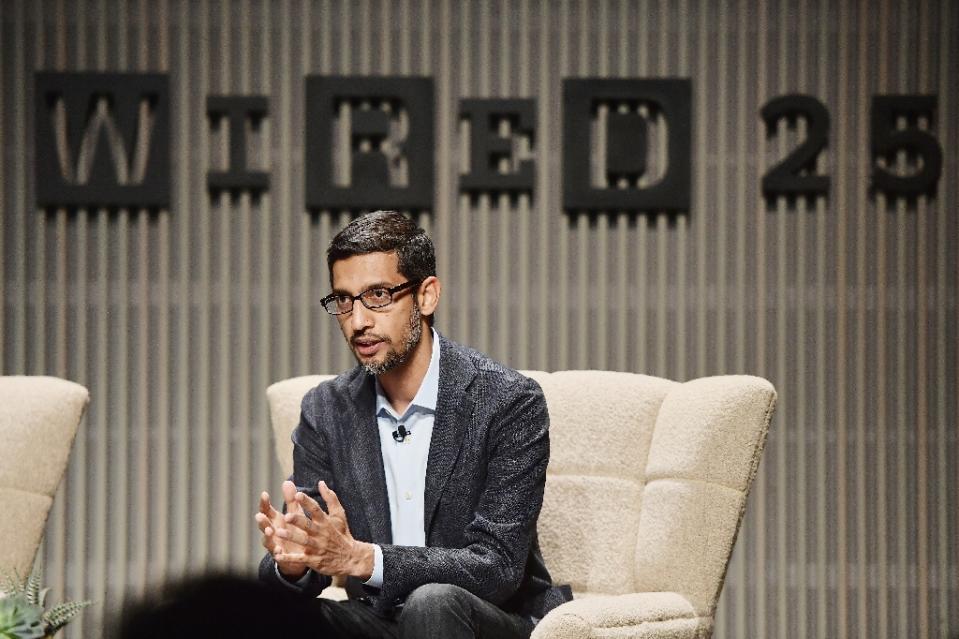Former Google engineer says China search engine would be 'stain' on company's reputation

Google CEO Sundar Pichai isn’t backing away from the company’s work on a new search engine for China. On Monday, Pichai told the Wired 25 Summit that the search engine, code-named Project Dragonfly, is still in the early stages, but that internal testing has shown the company could still serve more than 99% of Chinese citizens’ searches despite strict censorship there.
Project Dragonfly, which The Intercept first reported on in August, is a prototype of Google’s (GOOG, GOOGL) search engine designed for China. But to comply with China’s censorship regulations, Google has to filter out topics including human rights, democracy, freedom of religion and free speech.
But one former Google engineer says Pichai’s statement more or less follows the classic “trolley thought experiment.” As part of that thought experiment, a person must choose whether a runaway trolley should kill five people lying on the tracks it’s on — or whether the trolley should move to another track and kill just one person. In other words, doing business in China might hurt consumers, but not doing business in the country and providing them with Google’s services will hurt them more.
“I don’t think it’s worth it, and I think being complicit in censorship will be a stain on Google’s reputation forever,” Vijay Boyapati, who now works at a cryptocurrency startup, told Yahoo Finance.
In 2006 Google asked Boyapati to help create a filter for Google News in China, he said — but he says he refused to do so and was moved off of the project.
Google said it didn’t have anything to add when reached for comment on Boyapati’s statement, and pointed to a transcript of Pichai’s talk about the search engine.
It’s important to note that Google hasn’t announced any formal plans to launch Project Dragonfly, and that, as Pichai explained, the company is using the testing to see how a new search engine would work in the country.
“We don’t know whether we would or could do this in China, but we felt it was important for us to explore,” he said.
Complicit in censorship
According to Pichai, Google’s tests show that even with China’s strict filtering, the company could still answer more than 99% of search queries, and provide better information to consumers than what’s currently available in the country.
“Take when people type cancer treatments,” Pichai said. “You know, today people either get fake cancer treatments or, you know, they actually get useful information.”
But providing some information to consumers — while censoring subjects deemed subversive by China’s Communist Party — means Google would be complicit in the Chinese government’s efforts to hide topics antithetical to the regime.
“This reminds me of 2006 when Google had to go to Congress and they were scrutinized about all this,” Boyapati said. “Some of what was said to them in Congress then is definitely applicable now.”
Back then, members of the House Subcommittee on Africa, Global Human Rights and International Operations criticized Google, Microsoft and Yahoo (Yahoo Finance’s parent company, at the time) for adhering to the Chinese government’s censorship rules.
Will history repeat itself?
Google previously operated a search engine in China, but pulled it in 2010 following accusations that the search giant was hosting pornography and amid claims that China-based hackers had infiltrated the search giant.
Google, however, never fully left China. As Pichai pointed out in his talk, the company has engineers in the country, and offers its Android mobile operating system to Chinese smartphone makers.
“Anytime we do, you know, work in countries across the world … we are always balancing a set of values: we are providing users access to information, freedom of expression, user privacy, but we also follow the rule of law in every country we do [business in]. Obviously, you know, when it comes to China, given our history, it’s a more weighty topic,” Pichai said.
“Our intent was, the reason we did the internal project was … it’s been many years we’ve been out of the market … it’s a wonderful innovative market. We wanted to learn what it would look like if Google were in China,” he added.
Google’s work in China might not just be about search, though. A follow-up story by The Intercept explained that a prototype of the Dragonfly search engine could link users’ searches to their phone numbers. That, in turn, could make it easier for Chinese authorities to identify people searching for banned topics.
The report also said China could use Dragonfly to replace air pollution information in online news reports, giving the appearance that pollution levels aren’t as dangerous as they actually are. China has already been accused of doing just that.
While Google is only testing the waters for search in China, Boyapati predicts the tech giant might not be able to resist the allure of such a massive market.
“The Chinese market is so massive,” he said, “and I think the temptation is so great that they’ll rationalize it if they need to.”
More from Dan:
Google Maps releases update to make your commute less stressful
Facebook reveals 50 million accounts affected by security breach
Email Daniel Howley at [email protected]; follow him on Twitter at @DanielHowley. Follow Yahoo Finance on Facebook, Twitter, Instagram, and LinkedIn
